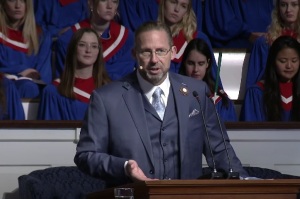Defense of Marriage Act Violates Constitution, Says Calif. Federal Judge
A federal district court judge on Wednesday ruled that a key provision in the Defense of Marriage Act is unconstitutional because it did not expend health benefits to a same-sex spouse. The case involved an employee of the federal court in San Francisco.
U.S. District Judge Jeffrey White's ruling is the last in a string of same-sex marriage cases that have been ruled on by California district and appeals courts.
Earlier this month a three-judge panel from the 9th Circuit Court of Appeals upheld an earlier decision by another U.S. district judge that overturned the state's voter approved amendment that banned same-sex marriages (Proposition 8).
White ruled that DOMA violated the equal protection clause of the Constitution by denying health benefits to the same-sex spouse of Karen Golinski. She and her partner, Amy Cunninghis, were married in August of 2008 during the brief period when same-sex marriages were allowed in California.
"The imposition of subjective moral beliefs of a majority upon a minority cannot provide justification for the legislation," wrote White in his decision.
The 1996 federal Defense of Marriage Act (DOMA), enacted under the Clinton administration, defines marriage as a legal union between one man and one woman for purposes of all federal laws, and provides that states need not recognize same-sex marriages from another state.
In 2010, a Massachusetts judge also ruled parts of DOMA to be unconstitutional. The case is now on appeal before the U.S. 1st Circuit Court of Appeals in Boston.
This week's ruling was the first since President Obama's attorney general, Eric Holder, said he would not defend DOMA because he and the president believed the act to be unconstitutional.
Since Holder announced his office would not defend DOMA, a group known as the Bipartisan Legal Advisory Group, comprised of five members of the House of Representatives, has defended the act. Last December, lawyers representing the group argued that DOMA was passed to protect and nurture traditional marriage.
However, White did not agree and in another part of his ruling stated that "tradition alone" does not legally justify legislation that singles out gay couples.
"The obligation of the court is to define the liberty of all, not to mandate our own moral code," White wrote. "The 'ancient lineage' of a classification does not render it legitimate."
Attorneys for either side were unavailable for comment prior to publication.





























